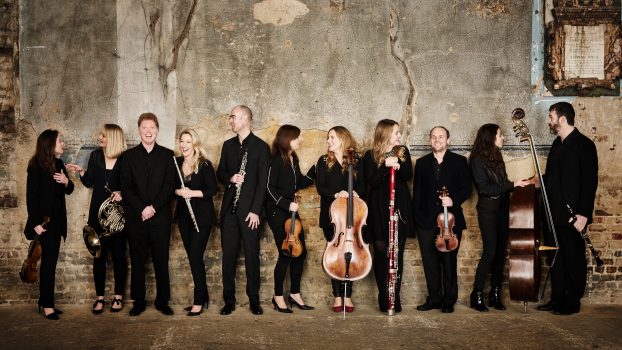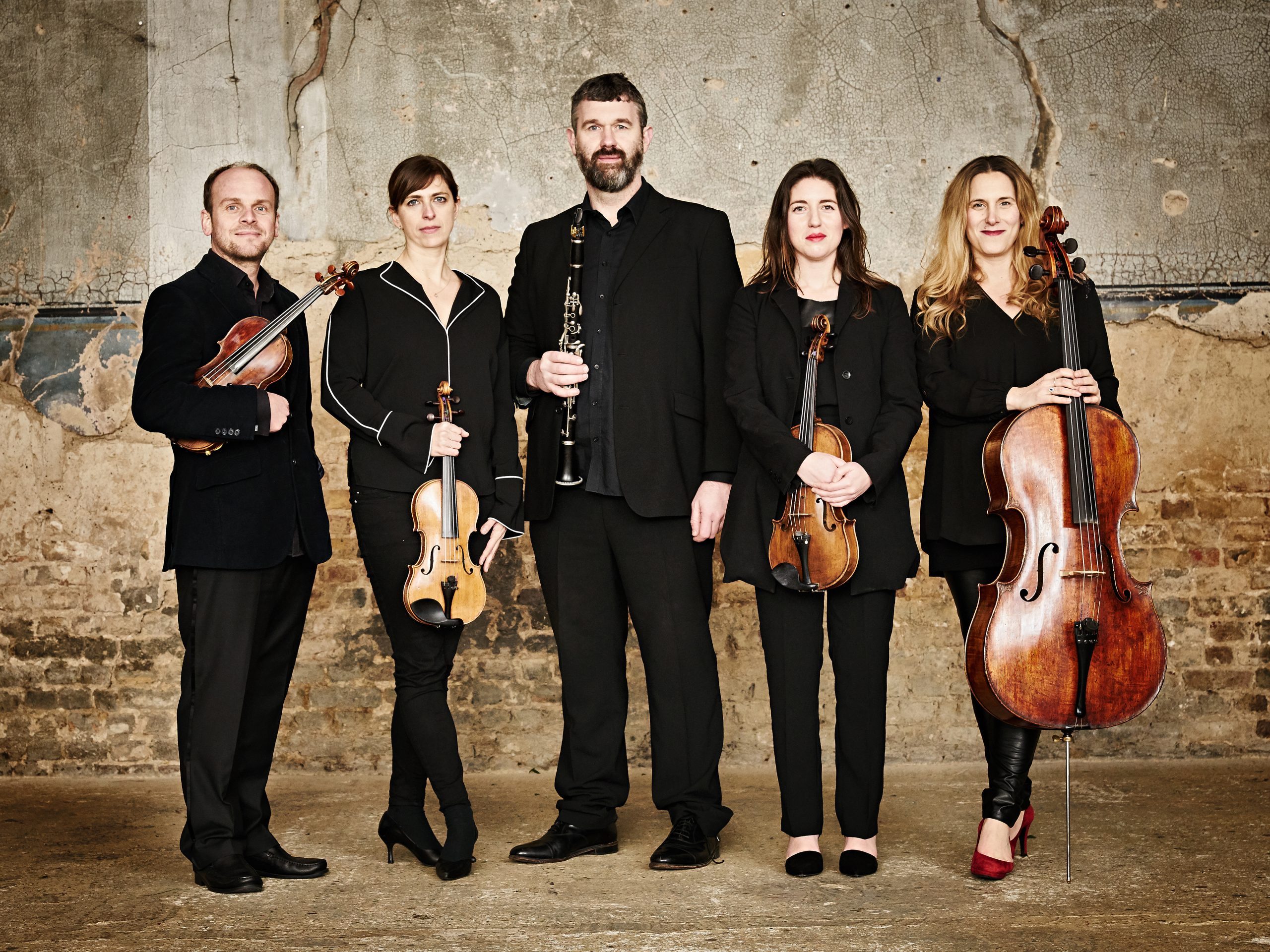FESTIVAL FINALE
Ensemble 360
Crucible Playhouse, Sheffield
Saturday 21 May 2022, 7.15pm
Tickets: £20
£14 Disabled & Unemployed
£5 Students & Under 35s
Save £s when you book for 5 or more concerts*
Past Event
BRITTEN Sinfonietta (16’)
KNUSSEN … Upon One Note (3’)
GRIME Five Northeastern Scenes (12’)
SLATER The Light Blinds RPS Composer 2021–22 Commission for Music in the Round (10’)
BRAHMS Serenade No.1 (47’)
Ensemble 360 brings the Sheffield Chamber Music Festival to a thrilling climax with a programme showcasing their endless versatility and brilliance. Benjamin Britten was a mentor to Oliver Knussen, and in turn, Knussen had a huge influence on our guest curator Helen Grime. This sequence of great British music is topped off by something completely different: lavish tunes, warm radiance and a jubilant ending courtesy of Johannes Brahms. The perfect finale!
Please note the change to the previously advertised programme for this concert.
We apologise for any disappointment this may cause.
PRE-CONCERT TALK 6.00pm – 6.45pm
ANGELA SLATER, HELEN GRIME & JAMES MURPHY Royal Philharmonic Society
FREE, please request tickets when booking for the 7.15pm concert
BRITTEN Benjamin, Sinfonietta Op.1
1. Poco presto ed agitato
2. Variations: Andante lento
3. Tarantella: Presto vivace
Britten was already a very prolific composer by the time he gave this work its designation as his official Opus One. Dedicated to his teacher, Frank Bridge, it was written when Britten was 18 years old, and it already demonstrates his extraordinary imagination. The influence of Schoenberg’s First Chamber Symphony is apparent in places, and the instrumental writing in all three movements has a fluency and flamboyance that quickly became hallmarks of the young Britten’s music. The first public performance was given on 31 January 1933 at the Mercury Theatre, London, in one of the Macnaghten-Lemare concerts played by the English Wind Players and the Macnaghten String Quartet, conducted by Iris Lemare. Britten’s music has always been more enthusiastically received abroad, and on 7 August 1933, the Sinfonietta was broadcast on Radio Strasbourg, conducted by the great Hermann Scherchen. The first British broadcast was a month later, by members of the BBC Symphony Orchestra conducted by Edward Clark.
© Nigel Simeone 2013
KNUSSEN Oliver, …Upon One Note
Purcell’s only five-part fantazia (Z745) gains its title ‘upon one note’ from the middle C which sounds throughout. From the first bar Oliver Knussen begins to distort the rhythms and pitches of his model while retaining the fixed C, which thus finds itself surrounded occasionally by very alien harmony indeed. As though out of a mist, the diatonic tonality of the original emerges from time to time to mark the ends of the sections, which follow the same plan as those of Fantazia 7 (Benjamin). During the final fast section Purcell’s music re-asserts itself unequivocally so that the closing bars are entirely as he wrote them.
© Mark Edgley Smith
GRIME Helen, Five Northeastern Scenes
Five North Eastern Scenes for oboe and piano was commissioned by the Kunstförderverein Kreis Düren e. V. for the 2016 Spannungen chamber music festival in Heimbach, Germany. The piece is in five short movements. The first, third and fifth explore space and melancholy, while the second and fourth are fleeting and at times more violent.
This is the third work in which I have used the paintings of the Scottish artist Joan Eardley as a starting point. Her vast, emotive snow scenes painted outside in the brief periods of calm between snow storms capture the striking yet bleak beauty of North East Scotland, an area where I grew up, but have not visited for many years.
© 2016 Helen Grime
SLATER Angela Elizabeth, The Light Blinds
The Royal Philharmonic Society commissioned Angela Elizabeth Slater as one of its 2021/22 Composers to write this work for Ensemble 360 at Music in the Round’s Sheffield Chamber Music Festival.
The Light Blinds for clarinet quintet explores the drama in extremes of light and darkness, charting a path through the spaces created by the tension of these opposing states. It draws on a short poem that I wrote whilst travelling home from a Music in the Round concert in 2021, following a day exploring the natural landscape around Sheffield.
The first material I wrote for this work was a short solo clarinet fragment, which is heard in the opening of the second section, exploring the line ‘The Light Blinds’. I used this material to shape and construct the rest of the piece, with this short 7/8 material acting as a central organising principle; the entire structure and pitch content emerges from it. This clarinet material is essentially veiled through it being stretched and texturally displaced within the quartet before being revealed in crystalline contrast with the solo clarinet against pulsing harmonics in the quartet. This ‘light blinds’ material becomes increasingly agitated, collapsing in on itself to form and explore the line ‘the dark engulfs’. Here the quartet concentrates on the lowest tessituras of their instruments and is accompanied by the bass clarinet, moving between dramatic and fragile multiphonics and aggressive rumbling material that pulls us further into the depths.
The dark engulfs
and the light blinds
in neither a sight
is seen in clarity
a blur, desperate to find a firm grip
in focus
Poem by Angela Elizabeth Slater
BRAHMS Johannes, Serenade No. 1 in D Op. 11, nonet version reconstructed by David Walter
Allegro Molto
Scherzo: Allegro non troppo
Adagio non troppo
Minuet
Scherzo: Allegro
Rondo: Allegro
Brahms’s D major Serenade is well known as his first orchestral work – but, like the D minor Piano Concerto from the same period, it had a complicated genesis. It was first conceived in 1857 as a Serenade for eight instruments in three or four movements, and a year later it had become a work in six movements, now scored for nine instruments. By 1860, it had been rewritten for full orchestra – the version that survives today (though Brahms even considered developing that into his first symphony, but decided to leave well alone). The nonet version was performed in public on 28 March 1859 at a concert in Hamburg, and a year later the orchestral version was given its premiere in Hannover. Whether Brahms destroyed the chamber version, or whether the material simply vanished is not known, but a skilful reconstruction reveals something of Brahms’s original conception: a work much closer in spirit to the serenades and divertimentos of Mozart than the reworked orchestral version.
© Nigel Simeone 2013





















